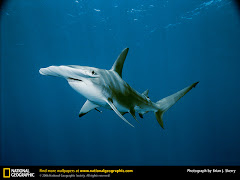I read an article today about shark dives and shark eco-tourism, and it started me thinking about all of my shark experiences. I have been so lucky to observe sharks in their environment without the assistance of any external triggers. I was living in Guam when I was certified, so it was easy for us to take a dive trip to Palau. Palau has (hopefully still has) a large population of grey reef sharks, and I was unprepared for that. There were so many sharks on the first dive that I couldn't keep count. We were diving in their environment...we went to them.
There is a lot of controversy about shark eco-tourism and shark dives, whether they involve chumming, the use of cages, or more normal settings. It is rare for a human to be killed during one of these excursions. And it's my opinion that excursions, dive or otherwise, that provide people with experiences to observe sharks in their natural setting will only eliminate prejudice, create awe, and increase conservation efforts.
One of the problems with some shark eco-tourism companies is that they lure sharks with chum (ground up fish), decoys, or actual food. It is a legitimate concern that sharks should not associate chummed water with human presence. Luring sharks to a certain area in this way only elicits behaviours that are not normal or natural for that particular setting. The practice of feeding sharks with divers present may also create a worrisome precedent, and accidents do happen under those conditions. These sorts of accidents can involve accidental bitings while feeding or mistaken-identity bites during the frenzy. A lot of shark eco-tourism is specific to reef settings and may involve species with more predictable behaviour patterns (nurse sharks, reef sharks, whitetip sharks, black tips, etc.). However, I want to clarify that all wild animals are unpredictable and should be treated with the utmost respect.
There is a demand for shark dives in areas frequented by larger and rarer species like tigers, bulls, and whites (great whites). Some of these shark dives involve the use of cages and luring. These charismatic species are sometimes difficult to find, and chumming is an effective method of drawing them near. But consider that, and I'm just guessing at numbers, say 2 trips a day over 7 days results in 14 trips in a week and 56 trips a month. Those numbers may be a little high, but that's just one company. If that one company heads to the same area (or even areas) for each trip, and the water is then chummed, the same sharks are being lured. They may associate the boat with chum and expect food, or they may eventually become desensitized to chumming in that area. I think the goal of all shark eco-tourism should be moderation, safety, and shark conservation.
Scientists utilize luring of sharks with chum and decoys in order to trigger hunting and feeding responses. Some of the white sharks at the Farallon Islands showed resistance to decoy response after desensitization to decoys by shark dive companies.
Don't get me wrong, I would love to cage dive with white sharks. Given the opportunity, I would do it. But I would want to chose the most scientific-minded and responsible company I could find. Open water diving with whites would be even more amazing! Now
that's an opportunity to observe the shark's behaviour in its natural environment! The benefits to shark conservation and research are invaluable.
 New Year's Resolutions:
New Year's Resolutions: